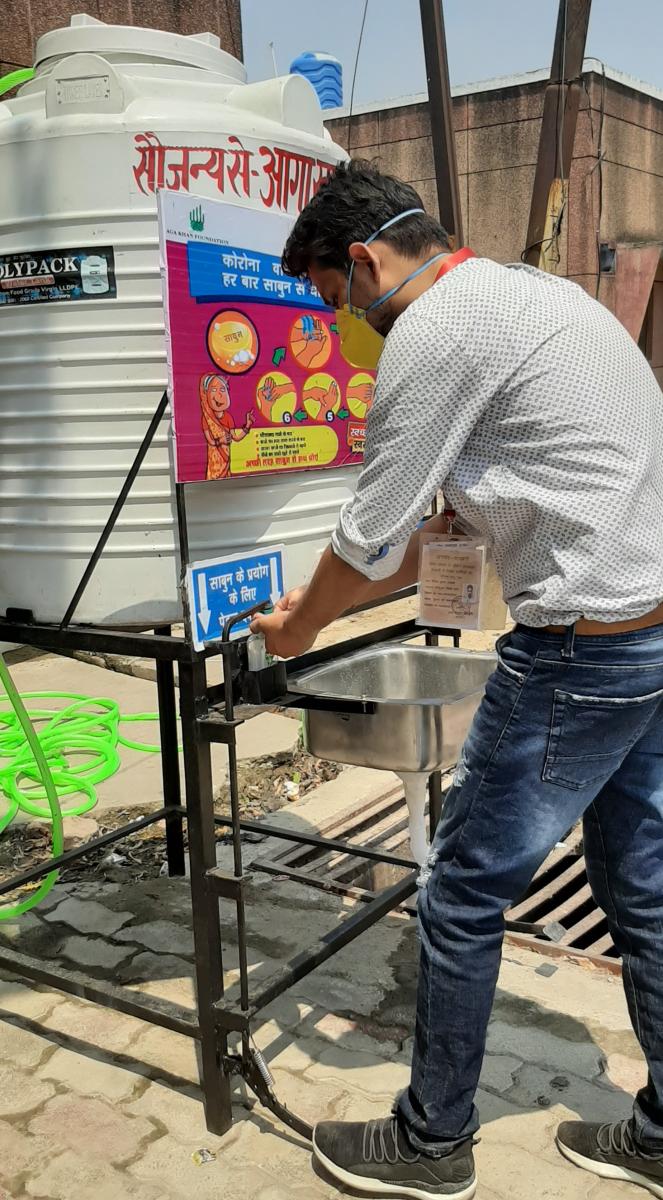The Aga Khan Foundation is organising WASH interventions in Uttar Pradesh and Bihar in response to the pandemic.
Published on: 03/09/2020
This blog is written by Dr Asad Umar, Senior Programme Officer WASH and Health, Aga Khan Foundation and Ms Satviki Varma, Senior Programme Officer Health and Nutrition, Aga Khan Foundation
With a presence in seven districts across two states, Aga Khan Foundation (AKF) has been responding to the WASH COVID-19 situation with the aim to build capacities and local resilience in rural and urban communities. The organisation works with governments at different levels and local leaders in communities on the ground. The organisation’s focus is on:
These interventions were informed by a rapid assessment that was conducted in April 2020 across four districts in two states (Uttar Pradesh and Bihar) to understand the WASH, health and nutrition constraints being faced during the pandemic. The respondents, reached via phone calls, included frontline workers, ragpickers and sanitary workers, healthcare facility providers, those in charge of quarantine centres, community members including SMC members, ward councillors, self-help group members and young adolescent girls.
Hygiene messaging using digital posters and audio messages were developed and aimed to reach over 40,000 people. There were eight core areas for hygiene messaging: hygiene during water collection/handling; during use of community toilets; handwashing; importance of physical distancing; respiratory hygiene; precautions at healthcare facilities and management of waste at healthcare facilities and hygiene measures for ragpickers and waste pickers.

Foot-operated handwashing station with soap designed by the Aga Khan Foundation (photo credit Aga Khan Foundation)
AKF designed an innovative foot-operated “no touch” handwashing stations. In three districts of Uttar Pradesh, AKF installed 31 of these handwashing stations, covering all 28 community health centres, district hospitals and district development offices. This innovation has been documented as best practice model within the University of Sussex’s Handwashing compendium for Low Resource Settings and has been adopted by other development partners (Centre for Science and Environment, WaterAid) in their implementation areas in India.
In addition to the information and trainings with frontline workers, AKF made available personal protective equipment (PPE) to ensure safety of essential service providers (including sanitation workers and also ragpickers), 8000 facemasks, 2500 gloves and sanitisers, and 51000 bars of soap.
We have come to understand COVID-19 as a highly contagious virus. Information on preventive steps need to reach everyone, the engagement with government at different levels was crucial for this. The following engagements with government were taken from the start of this crisis:
Regular communication with functionaries: A database of 22,000 frontline workers and functionaries was developed. The aim was to keep them informed and updated on the Government advisories and other COVID-19 information for their safety and the safety of communities they are responsible for.
Collaboration with district government: A 15 day-awareness campaign, in close collaboration with three district governments, was undertaken around COVID-19 (it covered dos and don’ts). This was linked to training of leadership of local self-governments, which then highlighted the steps they need to take to ensure safety of people in public places within their jurisdiction.
Capacity building of government stakeholders on COVID-19: Over 7200 functionaries at district level and below, Chief Development Officers, Block Development Officers, ASHA, Angandwadi workers, Panchayat Secretary and Gram Pradhans amongst others, were trained on COVID-19. The orientations focused on building an understanding of transmission of infection, contact tracing of people infected with COVID-19, preventive measures (hand and respiratory hygiene), general guidance on dos and don’ts, importance of handwashing, precautionary measures for health workers, disinfection, and safe disposal of waste.
This pandemic has clearly highlighted the importance of hygiene as a preventive measure for communicable infections and brought it to a whole new level. It is key that the efforts made need to be sustained and not looked at as only a response to this crisis. Government authorities need to consider:
Hygiene must be made business as usual, not a response to a crisis!
At IRC we have strong opinions and we value honest and frank discussion, so you won't be surprised to hear that not all the opinions on this site represent our official policy.